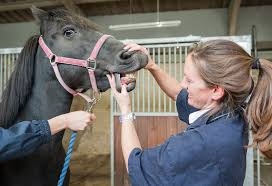UK Equine Healthcare Market Overview
The UK equine healthcare market is witnessing substantial growth as awareness of animal health, performance, and welfare continues to rise among equestrians, breeders, and horse owners. The market is driven by a combination of increasing equine sports participation, the rising demand for advanced veterinary services, and ongoing innovations in diagnostics, treatments, and nutritional support. The equine healthcare industry in the UK encompasses a range of services and products, including vaccines, parasiticides, diagnostics, rehabilitation, supplements, surgical procedures, and general veterinary care. The increasing economic value of sport horses and breeding operations has led to growing investments in preventive care and specialized treatments, positioning the UK as one of the most sophisticated equine healthcare markets in Europe.
The market is structured around several major segments, including product types, applications, and end-users. In terms of product types, the market is segmented into pharmaceuticals, vaccines, parasiticides, nutritional supplements, diagnostic tools, and wound care products. Among these, vaccines and parasiticides hold a significant share due to the essential role they play in preventing infectious diseases and controlling internal and external parasites in horses. Vaccines for equine influenza, tetanus, equine herpesvirus (EHV), and strangles are routinely administered, especially in competitive or breeding horses. Nutritional supplements are gaining popularity as more horse owners seek optimal health outcomes for performance, aging, or recovering horses. Supplements targeting joint health, digestion, and immunity are widely used across equestrian disciplines.
In terms of application, the market spans various health concerns including infectious diseases, musculoskeletal disorders, digestive issues, and respiratory conditions. Musculoskeletal disorders, particularly lameness, tendon injuries, and arthritis, remain the most common reason for veterinary visits and medical intervention in horses. As a result, treatments like intra-articular injections, regenerative therapies, and advanced imaging for diagnostics have become crucial. Digestive issues such as colic and gastric ulcers are also prevalent, requiring timely diagnosis and effective intervention through medications and dietary modifications. Respiratory conditions, often exacerbated by stabling and environmental factors, further drive demand for diagnostic and treatment solutions, especially among racing and competition horses.
The end-user segmentation of the UK equine healthcare market includes private veterinary clinics, equine hospitals, individual horse owners, and equestrian centers. Private equine practitioners and clinics account for a major share of the market due to their accessibility and personalized care services. Equine hospitals offer advanced diagnostics, surgical procedures, and inpatient care, catering to more severe and complex cases. Individual horse owners, including those involved in recreational riding, breeding, or competitive sports, represent a significant demand base, contributing to the growth of over-the-counter healthcare products and nutritional supplements.
Recent developments in the UK equine healthcare sector reflect a growing focus on technology integration and preventive health strategies. Telemedicine and remote consultations are gaining traction, especially in rural areas, allowing veterinarians to provide advice, monitor treatment progress, and manage chronic conditions without needing an in-person visit. Diagnostic innovations such as portable ultrasound, endoscopy, and digital radiography are improving early detection and treatment outcomes. Moreover, regenerative therapies like stem cell treatment and platelet-rich plasma (PRP) are increasingly adopted for orthopedic and soft tissue injuries, enhancing recovery rates and performance longevity in equine athletes.
Industry players are also investing in sustainability and ethical practices. Companies are reformulating products to reduce environmental impact, using biodegradable packaging, and ensuring ethical sourcing of ingredients. There is a growing emphasis on evidence-based treatments, with a rise in clinical trials and data-backed veterinary protocols. The expansion of equine insurance coverage in the UK is further supporting the adoption of advanced medical treatments, as more horse owners are willing to invest in high-quality healthcare when financial risk is mitigated.
Browse In-depth Market Research Report ➤➤➤ https://www.marketresearchfuture.com/reports/uk-equine-healthcare-market-52419
Several key companies are instrumental in shaping the UK equine healthcare landscape. Major pharmaceutical and animal health players such as Zoetis, Boehringer Ingelheim, Dechra Pharmaceuticals, Vetoquinol, and Ceva Animal Health have a strong presence in the country. These companies offer a wide range of equine-specific products, from vaccines and antiparasitics to performance-enhancing supplements and diagnostic tools. Local veterinary service providers like CVS Group and independent equine practices also play a critical role in service delivery, clinical research, and education initiatives aimed at improving equine health and welfare.
The market is driven by several important factors, including increased participation in equine sports such as dressage, eventing, and show jumping, which places a premium on horse health and performance. The breeding industry also contributes significantly, with high-value broodmares and stallions requiring top-tier reproductive care, neonatal health monitoring, and genetic screening. Rising awareness about animal welfare standards, especially under regulatory frameworks and initiatives led by bodies like the British Horse Society (BHS) and the Royal College of Veterinary Surgeons (RCVS), has compelled owners to invest more in preventive care and regular health check-ups.
The COVID-19 pandemic briefly disrupted veterinary services and competition schedules, but it also accelerated digital transformation and remote care practices in the equine healthcare space. Since then, the market has rebounded with increased spending, particularly in leisure and companion horse sectors, as interest in outdoor activities and equestrianism surged. Moreover, growing research and development investments in equine therapeutics and diagnostics continue to widen the scope of treatment options and improve clinical outcomes.
Regionally, England dominates the UK equine healthcare market due to the high concentration of equestrian events, training facilities, and veterinary clinics. Areas such as Newmarket, Lambourn, and Gloucestershire are renowned hubs for racing and sport horse care, supported by world-class equine hospitals and laboratories. Scotland and Wales also present opportunities for market expansion, particularly in rural and semi-urban regions where horse ownership is prevalent, and veterinary infrastructure is gradually improving. Government initiatives and grants promoting rural veterinary services and animal welfare education are expected to further support market development across the UK.
Explore MRFR’s Related Ongoing Coverage In Healthcare Domain:
Health and Wellness Product Market –
https://www.openpr.com/news/4104213/health-and-wellness-product-market-is-anticipated-to-grow-usd
Tablet Coating Market –
https://www.openpr.com/news/4104231/tablet-coating-market-size-to-reach-usd-21-42-billion-with-a-cagr
3D Printed Bones Market –
https://www.openpr.com/news/4104248/3d-printed-bones-market-worth-usd-3-84-billion-growing-at
Eggshell Membrane Market –
https://www.openpr.com/news/4104266/eggshell-membrane-market-projected-to-hit-usd-0-29-billion-at
Skin Microbiome Market –
https://www.openpr.com/news/4104280/skin-microbiome-market-to-reach-usd-24-56-billion-with-a-7-97


